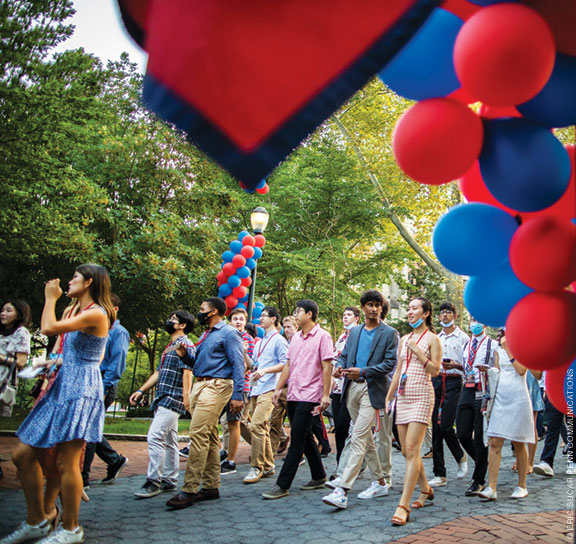
Freshmen and transfer students were welcomed to Penn—in person!—and urged to “think like a diplomat.”
Members of the Class of 2025 weren’t the only ones staring down new beginnings as they gathered outside of College Hall on the evening of August 30 to officially kick off the University’s 282nd year.
Two of the speakers at the Convocation ceremony—vice provost and dean of admissions Whitney Soule and interim provost Beth Winkelstein EAS’93—are new to Penn and their role, respectively. And Penn President Amy Gutmann acknowledged, to cheers from the audience of freshmen and transfer students, that she is ready to make a big jump of her own after being nominated to serve as the next US ambassador to Germany [“Gazetteer,” Sep|Oct 2021].
“As I share my thoughts with you today, I vividly remember what it felt like to be a first-year college student, as anxious as I was excited,” Gutmann said. “And now I am both excited and anxious about my future and the future of my family.”
Her advice to Penn’s new students, then, mirrored what she says she’s been trying to take in herself. And it boiled down to following the example set by Benjamin Franklin—not only Penn’s founder, whose statue stood among the crowd outside College Hall, but America’s first ambassador, who forged a key alliance with France during the Revolutionary War. “In France, Ben became a pop culture phenomenon,” Gutmann said. “If Instagram had existed, he would’ve been the CEO of going viral. He charmed the royal court with his signature spectacles, simple clothes, and homemade gifts. He dazzled philosophers and merchants alike with his intellect and wit.”
The key to Franklin’s success, Gutmann noted, was that he found strength in differences—something she hopes the members of the Class of 2025 will keep in mind as she urged them to “think like a diplomat.”
“Successful diplomats are both collaborative and independent-minded leaders,” Gutmann said. “To succeed, you will work with and lean on others. But never forget this: what each of you brings here is uniquely yours. Share it bravely and be curious about the unique differences of others. Those differences and your own unique perspective make our community increasingly innovative, and ever more inclusive. At Penn, thinking creatively and being curious about others, that’s what leads to breakthroughs.”
One breakthrough Gutmann cited was the “lifesaving one” from Drew Weissman and Katalin Kariko, who, after crossing paths at a copy machine, pioneered the messenger RNA technology used in the Pfizer and Moderna vaccines against COVID-19 [“The Vaccine Trenches,” May|Jun 2021]. The Penn president also touted Anea Moore C’19, a Rhodes Scholar who helped the University implement the Penn First Plus program for first-generation, low-income students.
“Among the many life-changing lessons to be learned from the examples of Drew and Kati and Ben and Anea are these: Always be open to that chance meeting on Locust Walk, in your College House, or with a faculty member,” Gutmann said. “Though you may be strangers, though you are independently working toward different goals, your collaboration could one day change the world.”
For many freshmen, simply navigating a changing world and getting to Penn was especially daunting this year. “More than any class before you,” Gutmann said, “you had to become expert navigators. You were given no road map for this pandemic.”
Yet destinations can still be reached without a road map, Winkelstein argued in her remarks. “Sometimes, external events—yes, even a pandemic—will set you off in some new direction,” said Winkelstein, who was appointed deputy provost in 2020 and has been serving as the University’s interim provost while Wendell Pritchett Gr’97 takes a medical leave of absence [“Gazetteer,” Jul|Aug 2021]. “But just as often, change comes from within. You’ll find joy or inspiration in some field or interest that’s new to you.”
Winkelstein told students “not to stress” about change, recounting how she was “sure she was going to be a doctor” when she arrived as a Penn freshman before a summer in a research lab after her sophomore year led to her becoming a bioengineer. “Taking chances—altering course—inevitably brings setbacks,” she said. “But it may also bring big rewards.”
As is a Convocation custom, the admissions dean welcomed a new Penn class, which this year is made up of 2,400 students, hailing from 88 countries, with one out of seven identifying as a first-generation college student (and 59 percent of the US citizens in the class identifying as students of color and 54 percent total as female). But Soule, who arrived at Penn just a couple of months before the freshmen, “didn’t read your applications because, like you, I’m new,” she said.
“I had to imagine what my life would be like if I came to Philadelphia to join this community,” continued Soule, who replaced Eric Furda C’87 as head of Penn’s admissions department. “And now we are all starting together.”
And if anyone in the crowd was feeling jittery about their first semester at Penn, Soule attempted to ease their nerves, commend them on their fortitude, and motivate them for their next few years. “If we wanted everything to stay the same, we would have stayed where we are,” she said. “We pushed through remote everything, through COVID, through loss, through restriction—and we can’t stop pushing.” —DZ




